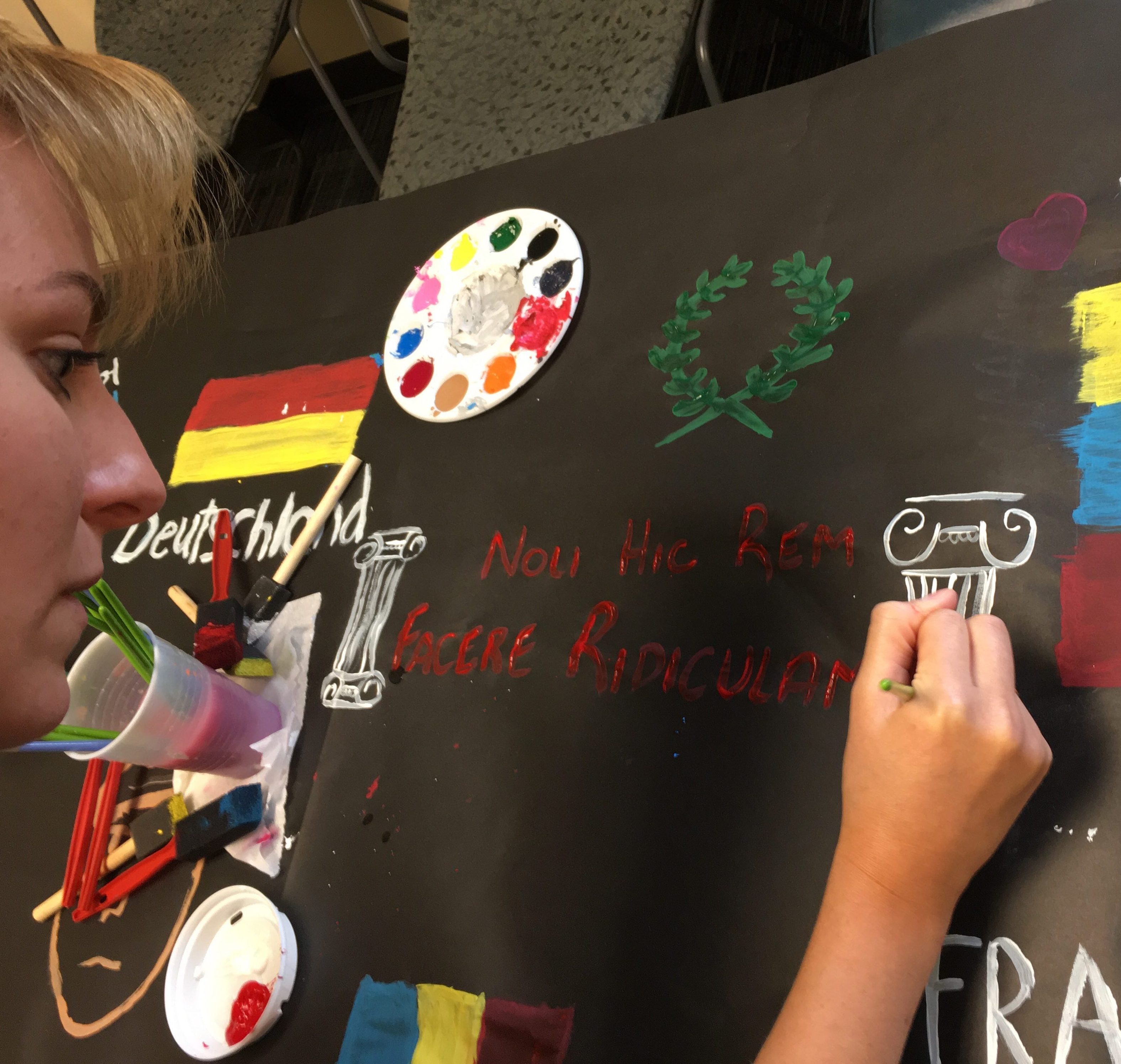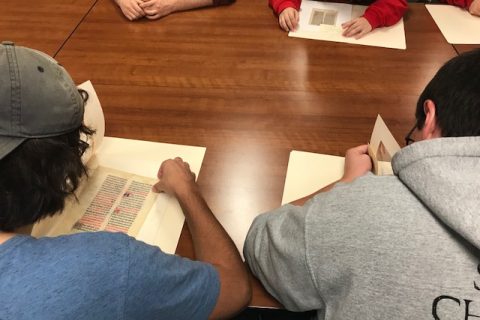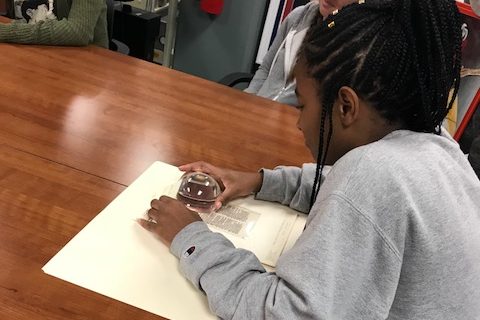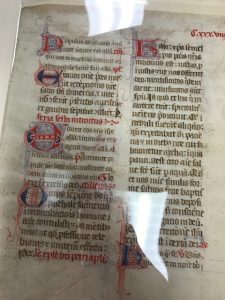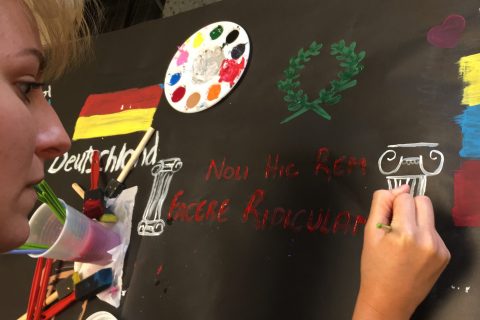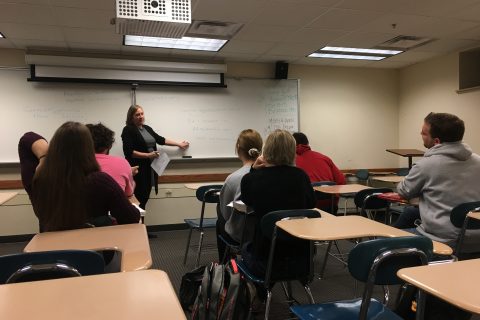A visit to a recent Latin 115 class began with Assistant Professor of History Kathryn Jasper announcing to the approximately 10 students, “Salvete! Today we are going to learn to express purpose in the coolest way possible!” The students, all sitting at the front of the room, nodded and smiled.
While Latin is commonly called a “dead language,” Jasper disagrees. She sees Latin as more than simply grammar to learn, but as a living language. A former Fulbright recipient, Jasper’s Ph.D. is in history and Medieval studies from the University of California Berkeley. She studied Latin over several summers in Rome under Father Reginald Foster, former member of the Latin Letters Department in the Vatican’s Secretariat of State. She models by speaking in Latin to her students during class, and by designating Friday classes as conversation day.
“Ubi est Iuliana?” asked Jasper about an absent student as she handed back graded homework. After members of the class replied, Jasper jumped into the day’s lesson with “Vobis placuit manuscriptus” in reference to their recent library visit.
Jasper next detailed the independent study that she will offer to some continuing students next semester. Based off of their visit to Milner Library earlier this week during which they looked at medieval manuscripts and rare books, students next semester will help identify some of the unknown manuscripts in the Milner archives. As they learn about paleography (how to read ancient documents) each student will adopt a manuscript and figure out what it pertains to and will of course, have to use their Latin. When asked about their reaction to the visit to Milner, one student responded by whispering a scream, “It was AWESOME!” Another student replied, “It was really cool to see it on paper—actually old animal skin—from so long ago. It’s cool, it’s like the same stuff that we’re learning!”
On this particular day in class, students learned a part of speech called the gerund and gerundive in which the verb acts as either a noun or an adjective.
“Quid significat?” Jasper asked. (Why know this, why care?) Because it allows you to more specifically explain the purpose (for the sake of, or, in order to).
Jasper gave examples of everyday expressions such as In tabernam ivi ad inveniendum lac. (I went to the store to find milk.), or Puella laudanda est puero. (The girl was praised by the boy.), or Venit causa pugnandi. (He came for the sake of fighting/in order to fight.) This final example causes the class to break out in free-form song lyrics “…came to fight!” “…came to get down!” followed by several students (and teacher) busting out the 1989 hip hop song, “Ice, Ice, Baby.” Students lit up and excitedly began asking whether this could be the next song that they translate. (They have previously translated songs from Moana and other Disney films.) One student jokingly said he prefers Hot Cross Buns, to which Jasper replied, “No Hot Cross Buns, but how about a children’s book?” Students again become animated with the idea of a children’s book, many suggesting “Go Dog, Go!” Jasper referred to songs and books with good conditional tenses and gerundives. After learning all of the basic structures of this new grammar point, Jasper asked “Estne hoc clarum?” (Is this clear?)
These students are passionate about learning Latin. Class meets at 8:40 a.m. three days a week, and students happily attend. According to one student, “Our class has always been really close. We all started three semesters ago and our class clicked, we just all got along and we all really enjoy Latin.” Languages classes typically remain small with fewer than 25 students, allowing students and teacher alike to get to know each other and learn in a much more personal way.
This particular class is made up of five-to-six English majors, one arts technology major, one history major, and one philosophy major. When asked how Latin is meaningful to them, some responses included:
“I tutor writing here at the University and Latin has helped me understand English better, which I think translates into not only my writing and my understanding of English, but into how I can help my students when I tutor them.”
“It doesn’t really apply to my major, but I’m getting a bachelor of arts, so I need three language credits. I already took Spanish in high school, and I had always been interested in Latin since it kind of connects a ton of different languages.”
“For philosophy, it’s actually incredibly applicable, especially when I’m writing papers, a lot of the terminology philosophy uses is all in Latin, so to study Latin and see how that fits in too, and be able to read actual writings, that is really cool.”
“I don’t think I would have passed The Structure of English Grammar without Latin. The class was very confusing, but when the teacher brought up gerunds, I was like: ‘Why do I know that? Why do I feel comfortable with this already? Like, this is ok!’ And it was because I already knew how to do it in Latin, I just had to figure out how to do it in English.”
When asked what they want to do with Latin someday, one person referred to the absent student to say that her future plan is to be a Latinist. Another student said, “I wouldn’t teach it, but I would apply it to my classrooms, for example, when I’m talking about sentence structure, I would bring up: ‘Man, back in the Roman days, they would do it like this’.” A third student said passionately: “It’s what I want to do. I want to be a historian/archeologist…I want to be like Dr. Jasper!”
Latin Club meets on Wednesdays at 8 p.m., and most everyone from the class takes part. Their main objectives are to talk about Latin. They are also planning a Roman-themed Friendsgiving as well as a Halloween Latin lock-in. Once they figure out a firmer direction for the club they will begin recruiting lower level Latin students.
One thing is for sure, for these students, Latin remains very much alive.
